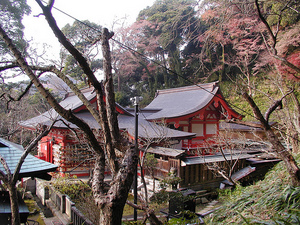Difference between revisions of "Egara Tenjin Shrine"
m (→References) |
|||
| (One intermediate revision by the same user not shown) | |||
| Line 13: | Line 13: | ||
==References== | ==References== | ||
*Plaques on-site. | *Plaques on-site. | ||
| + | |||
| + | ==External Links== | ||
| + | *[http://maps.google.com/maps?q=%E8%8D%8F%E6%9F%84%E5%A4%A9%E7%A5%9E%E7%A4%BE&hl=en&ie=UTF8&sll=36.776467,139.441154&sspn=0.037743,0.037251&t=h&hq=%E8%8D%8F%E6%9F%84%E5%A4%A9%E7%A5%9E%E7%A4%BE&z=14 Egara Tenjin on Google Maps] | ||
[[Category:Shrines]] | [[Category:Shrines]] | ||
[[Category:Heian Period]] | [[Category:Heian Period]] | ||
Latest revision as of 13:40, 27 March 2012
- Established: 1104
- Japanese: 荏柄天神社 (Egara Tenjin sha)
Egara Tenjin is a Shinto shrine in Kamakura counted as one of Japan's three great Tenjin shrines, along with Fukuoka's Dazaifu Tenmangû and Kyoto's Kitano Tenmangû. (Umeda Tenmangû in Osaka is sometimes included as the third instead of Egara Tenjin.)
It is said that in 1104, an image of Tenjin fell to earth in Kamakura during a thunderstorm. This was revered by the local villagers, and from that time the shrine was built and worship began. The shrine was originally known as Egara-san Tenmangû.
When Minamoto no Yoritomo established the shogunate in Okura this shrine was worshipped as the protector of the kimon, the unlucky northeastern direction.
A gingko tree at the shrine is said to be the second oldest gingko in the city, after that at Tsurugaoka Hachimangû. The tree has been designated a "Natural Monument of the City" (市天然記念物).
References
- Plaques on-site.
